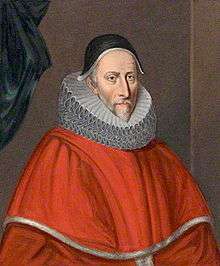Thomas Crewe

Sir Thomas Crewe (or Crew) (1565 – 31 January 1634), of Stene in Northamptonshire, was an English Member of Parliament and lawyer, and served as Speaker of the House of Commons from 1623 to 1625.
Crewe was a member of Gray's Inn, and a serjeant-at-law. He entered Parliament in 1604 as Member for Lichfield, and was later MP for Northampton (1621-2), Aylesbury (1623-5) and Gatton (1625). In 1621 he drew attention to himself by defying the King, declaring the liberties of Parliament to be "matters of inheritance". In 1623 he was knighted, and in the Parliament summoned that year (which first assembled in February 1624) he was elected Speaker; he served in that capacity in the two Parliaments known to history as the Happy Parliament and the Useless Parliament. In 1633, he was appointed a member of the ecclesiastical commission. He died the following year.
Crewe's son, John, followed him into Parliament, and was raised to the peerage as Baron Crew in 1661 for his role in bringing about the Restoration.
Sir Thomas Crew married Temperance Bray, daughter of Reynold Bray and Hon. Anne Vaux. He lived at Stene, Northamptonshire, and died on 31 January 1633.
References
- Concise Dictionary of National Biography (1930)
- Burke's Extinct Peerage (London: Henry Colburn & Richard Bentley, 1831)
- Mark Noble, Memoirs of several persons and families... allied to or descended from... the Protectorate-House of Cromwell (Birmingham: Pearson & Rollason, 1784)
.svg.png)